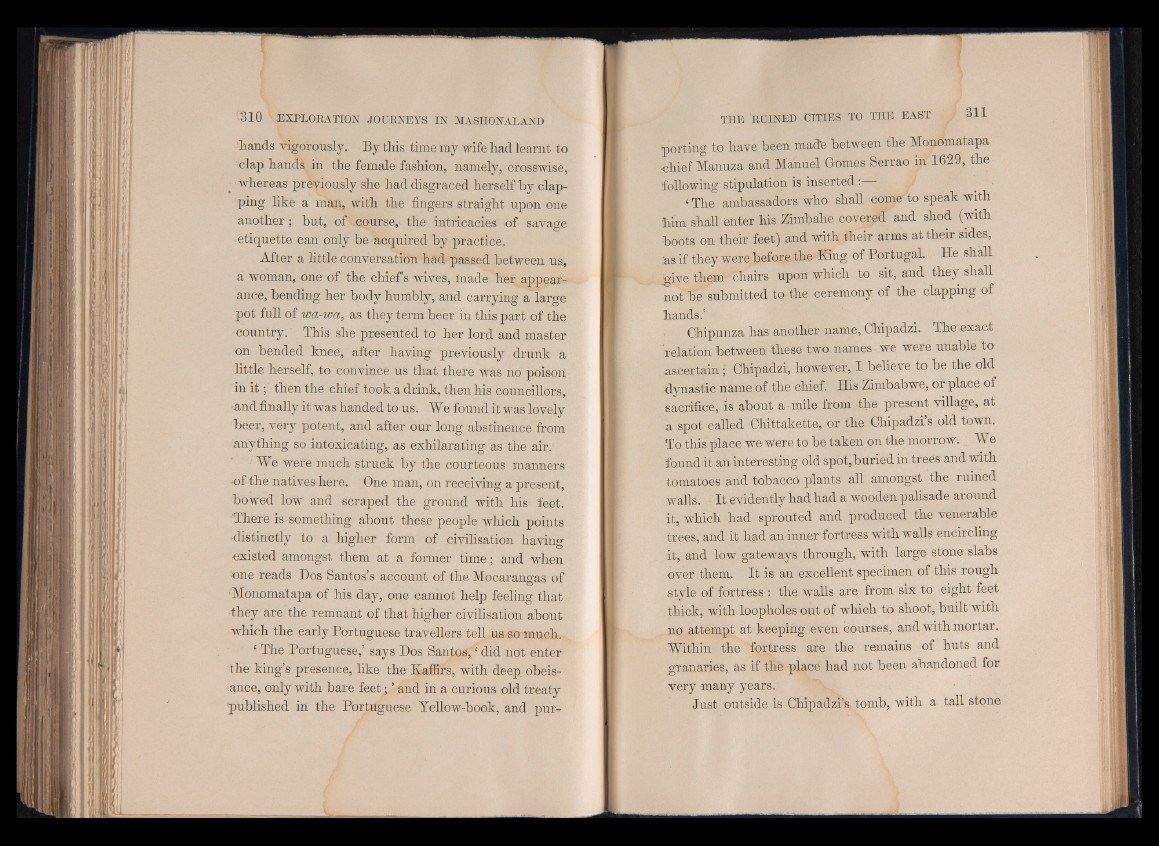
hands vigorously. By this time my wife had learnt to
'clap hands in the female fashion, namely, crosswise,
_ whereas previously she had disgraced herself by clapping
like a man, with the fingers straight upon one
another; but, of course,- the intricacies of savage
■etiquette can only be acquired by practice.
After a little conversation had passed between us,
a woman, one of the chiefs wives, made her appearance,
bending her body humbly, and carrying a large
pot full of wa-wa, as they term beer in this part of the
-country. This she presented to her lord and master
on bended knee, after having previously drunk a
little herself, to convince us that there was no poison
in i t ; then the chief took a drink, then his councillors,
•and finally it was handed to us. We found it was lovely
beer, very potent, and after our long abstinence from
anything so intoxicating, as exhilarating as the air.
We were much struck by the courteous manners
■of the natives here. One man, on receiving a present,
bowed low and scraped the ground with his feet.
There is something about these people which points
distinctly to a higher form of civilisation having
•existed amongst them at a former time; and when
■one reads Dos Santos’s account of the Mocarangas of
•Monomatapa of his day, one cannot help feeling that
■they are the remnant of that higher civilisation about
which the early Portuguese travellers tell us so much.
‘ The Portuguese,’ says Dos Santos, ‘ did not enter
the king’s presence, like the Kaffirs, with deep obeisance,
only with bare feet; ’ and in a curious old treaty
published in the Portuguese Yellow-book, and purporting
to have been mad'e between the Monomatapa
chief Manuza and Manuel Gomes Serrao in 1629, the
following stipulation is inserted :—
t The ambassadors who shall come to speak with
kirn shall enter his Zimbahe covered and shod (with
boots on their feet) and with their arms at their sides,
As if they were before the King of Portugal. He shall
give them chairs upon which to sit, and they shall
not be submitted to the ceremony of the clapping of
hands.’
Chipunza has another name, Chipadzi. The exact
relation between these two names we were unable to
ascertain; Chipadzi, however, I believe to be the old
dynastic name of the chief. His Zimbabwe, or place of
sacrifice, is about a-mile from the present village, at
a spot called Chittakette, or the Chipadzi’s old town.
To this place we were to be taken on the morrow. We
found it an interesting old spot, buried in trees and with
tomatoes and tobacco plants all amongst the ruined
walls. It evidently had had a wooden palisade around
it, which had sprouted and produced the venerable
trees, and it had an inner fortress with walls encircling
it, and low gateways through, with large stone slabs
over them. It is an excellent specimen of this rough
style of fortress : the walls are from six to eight feet
thick, with loopholes out of which to shoot, built with
no attempt at keeping even courses, and with mortar.
Within the fortress are the remains of huts and
granaries, as if the place had not been abandoned for
very many years.
Just outside is Chipadzi’s tomb, with a tall stone